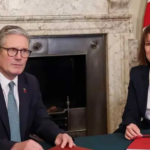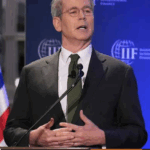Chancellor Rachel Reeves has argued that Britain has “no choice at all” but to engage with China as she seeks to bolster economic growth against the backdrop of rising borrowing costs and volatile financial markets. Reeves, who arrived in Beijing to finalise trade and investment agreements worth £600 million over five years, is the first UK chancellor to visit China in over five years.
The trip comes as the UK faces persistent inflation and growing concerns about how quickly the Bank of England can reduce interest rates. The yield on 30-year government debt remains at a 27-year high, and the pound continues to struggle against the dollar, reminiscent of last year’s financial turmoil.
Reeves has reaffirmed her “non-negotiable” fiscal rules, underlining the importance of economic stability in restoring market confidence. The Treasury’s upcoming spending review is expected to call for efficiency savings of at least 5% across government departments, a figure that may rise further due to increased debt-servicing costs. Although Reeves has pledged not to repeat the tax hikes seen last autumn, her options remain limited due to persistent inflationary pressures.
Paul Johnson, director of the Institute for Fiscal Studies, warned that breaching the Chancellor’s borrowing limits could trigger further market instability, raising yields even higher. With economic growth subdued and tax receipts underperforming, the cost of servicing government debt is becoming a growing concern.
In a bid to counter these financial pressures, Reeves is focusing on strengthening the UK’s trade and investment ties with China. She argued that the UK’s previous reluctance to engage with Beijing put the country at a disadvantage compared to France and Germany, both of which have significantly expanded their commercial relationships with China. As the world’s second-largest economy and the UK’s fourth-largest trading partner, China plays a vital role in supporting British jobs and exports.
Agreements reached with Chinese Vice Premier He Lifeng include enhanced cooperation in sectors such as financial services, cross-border investment, climate change initiatives, and agriculture. “Choosing not to engage with China is therefore no choice at all,” Reeves said, stressing that Britain should maintain “respectful and consistent” relations with China despite ideological differences.
In the financial markets, investors have become increasingly cautious about UK assets, with inflation remaining stubbornly above the Bank of England’s target of 2%. Although markets had expected interest rate cuts this year, the likelihood of those cuts happening is now in doubt, with potential implications for the 1.8 million households facing rising mortgage costs.
Reeves’s challenge is to strengthen trade ties abroad while maintaining fiscal discipline at home. As the UK navigates these turbulent economic waters, her trip to Beijing underscores a broader strategy to stabilise markets, foster growth, and build international alliances, even in politically sensitive areas.









